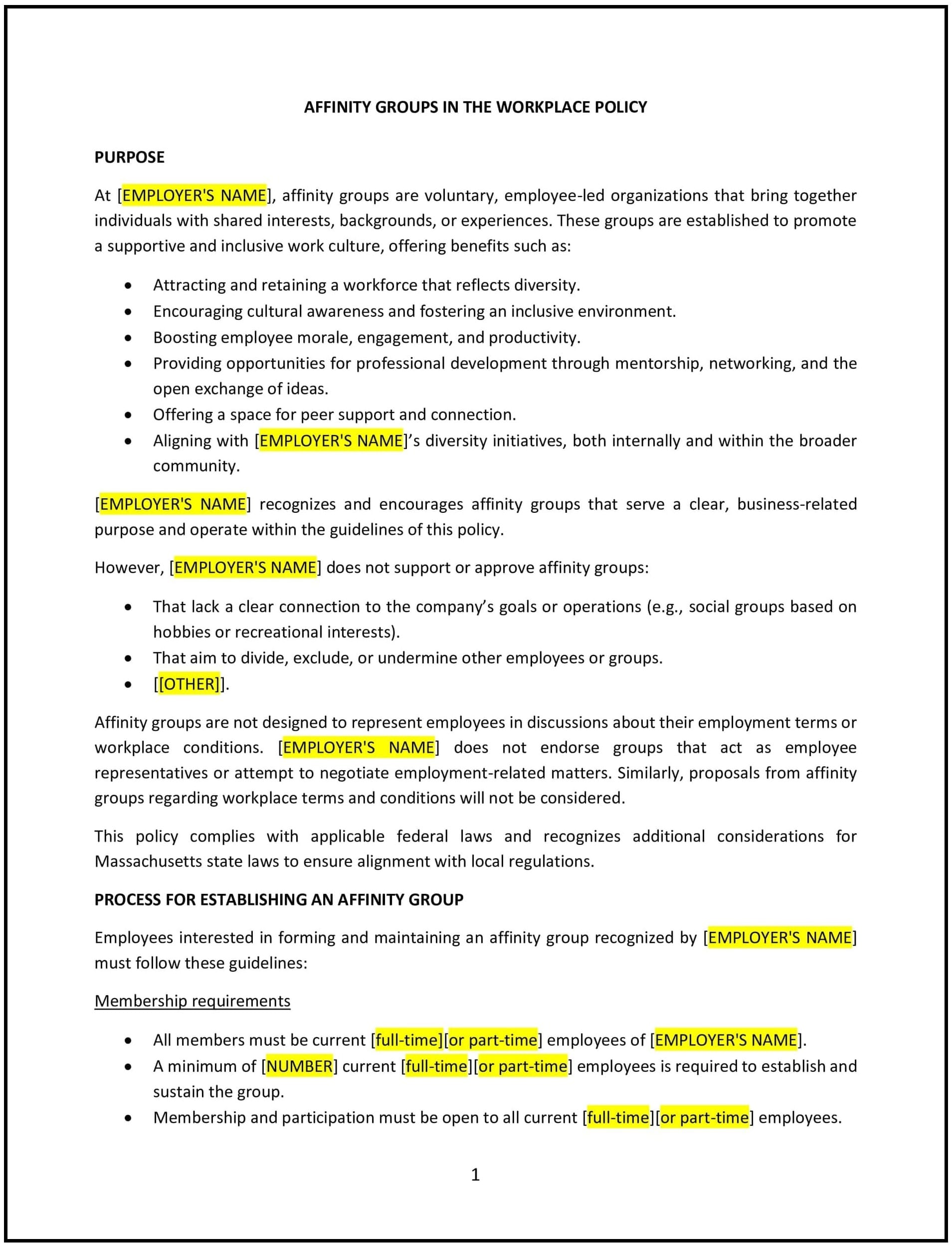Affinity groups in the workplace policy (Massachusetts): Free template
Got contracts to review? While you're here for policies, let Cobrief make contract review effortless—start your free review now.

Customize this template for free
This affinity groups in the workplace policy is designed to help Massachusetts businesses establish guidelines for the formation and operation of employee affinity groups. Affinity groups are voluntary, employee-led groups that aim to foster a diverse and inclusive workplace by providing employees with the opportunity to connect based on shared characteristics, interests, or experiences. The policy outlines how these groups can be created, supported, and managed within the company.
By adopting this policy, businesses can promote diversity, equity, and inclusion (DEI) in the workplace, enhance employee engagement, and provide a supportive environment where employees can express themselves and find community.
How to use this affinity groups in the workplace policy (Massachusetts)
- Define affinity groups: Clearly define what constitutes an affinity group within the company, including the types of groups that may form (e.g., based on gender, race, ethnicity, sexual orientation, veteran status, disability, etc.). The policy should specify that groups are voluntary and open to all employees regardless of membership in the affinity group’s focus.
- Establish group formation procedures: Outline the process for employees to propose and form an affinity group, including any approval process from HR or management, and the minimum number of employees needed to form a group.
- Set group guidelines: Specify the expected conduct and activities of affinity groups, including their goals, meeting schedules, and communication guidelines. The policy should also make it clear that affinity groups must adhere to the company’s overall values and code of conduct.
- Provide company support: Explain the company’s support for affinity groups, including the provision of resources (e.g., meeting spaces, time for meetings, funding for events or activities), and how the company will promote participation in these groups.
- Promote inclusivity: Ensure that affinity groups are inclusive and do not create divisive environments or contribute to discrimination. The policy should emphasize the company’s commitment to fostering a workplace that values respect, inclusivity, and open dialogue.
- Encourage participation: Encourage employees to participate in affinity groups, whether they are members of the group’s focus or allies. The policy should clarify that participation is voluntary but encouraged as part of the company’s broader diversity and inclusion efforts.
- Address potential conflicts of interest: Establish protocols for handling any conflicts or issues that arise between affinity groups or within the groups themselves. This includes ensuring that all group activities align with company values and policies.
- Provide guidelines for leadership: Outline the role of leadership and managers in supporting affinity groups, including offering guidance, facilitating participation, and ensuring groups are functioning within the company’s framework.
- Ensure compliance with Massachusetts state laws: Ensure that the policy complies with Massachusetts state laws regarding workplace diversity and inclusion, as well as federal regulations related to employee rights and workplace protections.
Benefits of using this affinity groups in the workplace policy (Massachusetts)
This policy offers several benefits for Massachusetts businesses:
- Enhances diversity and inclusion: By supporting employee-led affinity groups, businesses can foster a more inclusive and diverse work environment, where employees feel valued and supported.
- Increases employee engagement: Affinity groups offer employees a sense of belonging and an opportunity to contribute to a positive workplace culture, increasing overall engagement and job satisfaction.
- Supports employee development: Affinity groups provide employees with professional development opportunities, including networking, mentorship, and leadership experience, which can help them grow both personally and professionally.
- Strengthens company culture: A culture of inclusivity and mutual respect can improve collaboration, communication, and employee morale across the organization.
- Attracts and retains talent: Companies that support diversity and inclusion efforts, such as affinity groups, are more likely to attract top talent and retain employees who value a diverse and supportive work environment.
- Improves organizational performance: A diverse and inclusive workplace has been shown to contribute to better decision-making, creativity, and overall business performance.
Tips for using this affinity groups in the workplace policy (Massachusetts)
- Communicate the policy clearly: Ensure that all employees are aware of the policy and the opportunities for forming or joining affinity groups. This can be communicated through the employee handbook, internal newsletters, or orientation sessions.
- Encourage leadership support: Leaders should actively support affinity groups by participating in group activities, helping to promote their initiatives, and ensuring that group activities align with the company’s values and goals.
- Provide resources for group activities: Offer resources such as meeting spaces, time off to attend meetings, and financial support for events to help affinity groups succeed.
- Foster a culture of respect and inclusion: Ensure that all employees understand the importance of respecting each other’s differences and that affinity groups are not a means of division but a tool for fostering mutual respect.
- Address concerns promptly: If any issues or conflicts arise between affinity groups or within the groups, address them promptly and professionally to ensure the workplace remains a safe and respectful environment for all employees.
- Review and update regularly: Periodically review the policy to ensure it remains aligned with Massachusetts state laws, federal regulations, and the company’s evolving diversity and inclusion initiatives.